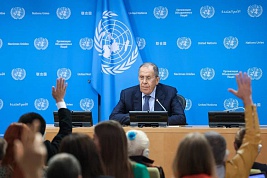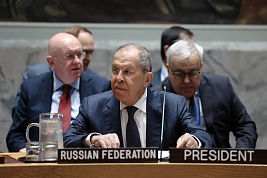Comment by the Information and Press Department on the visit of Mongolian Foreign Minister Lundeg Purevsuren to Russia
The Foreign Minister of Mongolia, Lundeg Purevsuren, will come to Russia for a working visit on September 10-12 at the invitation of Foreign Minister Sergey Lavrov.
During their talks on September 11, the two diplomats will talk about Russian-Mongolian relations and their further development based on the implementation of the agreements reached at the top level during President Vladimir Putin’s visit to Ulan Bator in September 2014, and a visit by Mongolian President Tsakhiagiin Elbegdorj to Moscow in May 2015. The ministers will also discuss regional and global issues and the key aspects of Russian-Mongolian cooperation at international and regional venues.
The agenda for the visit includes consultations between Mr Purevsuren, Sergey Donskoy, Minister of Natural Resources and Environment and Co-chair of the Russian-Mongolian Intergovernmental Commission for Trade, Economic, Scientific and Technical Cooperation, and Minister of Agriculture Alexander Tkachev. They will address the practical aspects of the further strengthening of bilateral cooperation in a number of spheres.
Relations with Mongolia are a priority of Russian foreign policy. Mongolia is not only a close neighbour, but is also a key strategic partner. Russian-Mongolian relations are multifaceted and based on traditions of good-neighbourliness, centuries of bilateral cooperation, close economic and cultural ties and a similar attitude to many issues on the international and regional agendas.
The two countries have sealed their desire to strengthen their cooperation in a number of basic documents such as the Declaration of Strategic Partnership signed in 2009, which set out the priority spheres for the development of strategic partnership. Russia and Mongolia have been working hard recently to give a fresh impetus to the entire package of bilateral relations.
Vital elements in this respect have included a meeting of the Russian and Mongolian leaders in Shanghai in May 2014 and President Putin’s working visit to Mongolia in September 2014 for the celebrations of the 75th anniversary of victory over Japan in the Battle of Khalkin Gol. The May 2015 visit of President Elbegdorj to Moscow was very significant. Mr Putin’s meeting with Prime Minister Chimediin Saikhanbileg on the sidelines of the St Petersburg International Economic Forum in June 2015 was useful for adjusting opinions on current issues of bilateral relations.
The agenda in the near term includes a visit of a State Duma delegation led by Speaker Sergey Naryshkin for the autumn meeting of the OSCE Parliamentary Assembly in Ulan Bator, and a reply visit by the Mongolian Parliament Speaker, Zandaakhüügiin Enkhbold, to Moscow.
An immediate objective is to complete the drafting of a Mid-term Programme for the Development of Strategic Partnership in accordance with an agreement between the Russian and Mongolian heads of state. The programme will outline the parameters of cooperation in all spheres of practical interaction.
Russian-Mongolian trade and economic cooperation has a solid potential for development. Russian-Mongolian joint ventures Erdenet, Mongolrostsvetmet and the Ulan Bator Railway (UBTZ), leading companies in the Mongolian economy, provide a reliable basis for the further development of economic cooperation. Plans provide for the increased export of Russian transport and energy engineering products to Mongolia and the participation of Russian companies in infrastructure and mining projects in Mongolia.
Russia and Mongolia have a good opportunity to strengthen their trade and economic ties by participating in international integration processes and trade liberalisation structures. Cooperation between Mongolia and the Eurasian Economic Union (EAEU) holds special promise. The first step towards simplifying the access of Mongolian products to the EAEU market was a memorandum of cooperation signed between the Eurasian Economic Commission and the Mongolian government.
Another highlight is the development of trilateral cooperation between Russia, Mongolia and China, which was launched during the first ever meeting of the three leaders in Dushanbe on September 11, 2014. The implementation of the documents which Vladimir Putin, Tsakhiagiin Elbegdorj and Xi Jinping signed on the sidelines of the SCO summit in Ufa on July 9, 2015 will open a new chapter in the history of trilateral cooperation.
This year, Russia and Mongolia jointly celebrated the 70th anniversary of the end of World War II, which is a special date for our two nations. Several joint events were held to mark the 70th anniversary of the Victory. The Mongolian President attended the May 9 celebrations in Moscow, and the presidents of Russia and Mongolia took part in China’s Victory Day celebrations on September 3. Mongolia provided general assistance to Russia during the difficult war years, contributing to the victory over German Nazism and Japanese militarism. There were Mongolian volunteers in the Red Army. In August 1945, the Mongolian People’s Army contributed to the routing of the Kwantung Army of Japan. The best traditions of friendship and mutual assistance developed and grew stronger in Russia and Mongolia during the difficult war years, providing the basis for the subsequent strengthening of bilateral relations.
September 10, 2015


